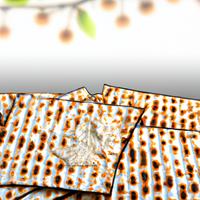
1 serving (30 grams) contains 110 calories, 3.0 grams of protein, 0.5 grams of fat, and 22.0 grams of carbohydrates.

Log this food in SnapCalorie

Nutrition Information
Calories |
880.0 | ||
|---|---|---|---|
% Daily Value* |
|||
| Total Fat | 4.0 g | 5% | |
| Saturated Fat | 0 g | 0% | |
| Polyunsaturated Fat | 0 g | ||
| Cholesterol | 0 mg | 0% | |
| Sodium | 640.0 mg | 27% | |
| Total Carbohydrates | 176.0 g | 64% | |
| Dietary Fiber | 8.0 g | 28% | |
| Sugars | 0 g | ||
| protein | 24 g | 48% | |
| Vitamin D | 0 mcg | 0% | |
| Calcium | 80.0 mg | 6% | |
| Iron | 4.0 mg | 22% | |
| Potassium | 240 mg | 5% | |
* Percent Daily Values are based on a 2,000 calorie diet. Your daily values may be higher or lower depending on your calorie needs.
Food Attributes
Source of Calories
About Matzoh cracker
Matzoh crackers are thin, crisp unleavened bread traditionally made from simple ingredients like flour and water. They are a staple in Jewish cuisine, particularly during Passover, when leavened bread is prohibited. Originating from the ancient practice of baking quickly to avoid fermentation, matzoh holds cultural and religious significance. Nutritionally, matzoh crackers are low in fat and cholesterol, making them a lighter option for snacking or as a base for toppings. However, standard matzoh is low in fiber and may contain a high carbohydrate content depending on serving size, offering minimal sustained energy. Whole-wheat varieties are available for a more nutritious alternative, providing increased fiber and micronutrients. Matzoh crackers are versatile and can be paired with healthy spreads or dips, but moderation is key, especially for individuals monitoring calorie or carb intake.



